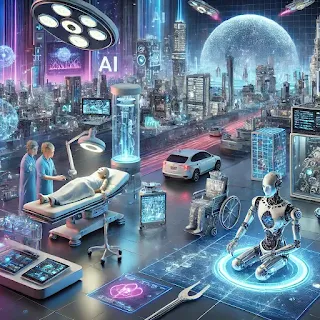AI Applications ka Farogh: 2025 mein Naye Rujhanat
Introduction
Artificial Intelligence (AI) rapidly evolving, influencing various industries and reshaping our daily lives. As we step into 2025, AI applications are expanding beyond traditional boundaries, revolutionizing sectors like healthcare, finance, automation, and creative industries.
This article explores the latest AI trends of 2025, how AI is changing industries, and what we can expect in the future.
1. AI in Healthcare: Advanced Diagnostics & Personalized Medicine
AI has significantly transformed healthcare by enabling faster, more accurate diagnostics and improving patient care.
✅ AI-powered diagnostics – Detecting diseases like cancer at an early stage.
✅ Robotic surgeries – Enhancing precision in complex medical procedures.
✅ Personalized treatment plans – AI analyzes patient history to recommend better treatments.
By 2025, AI is expected to help doctors predict diseases before they occur, improving global healthcare efficiency.
2. AI in Automation: The Rise of Smart Workplaces
Automation is taking over repetitive tasks, increasing productivity and efficiency in workplaces.
✅ AI-powered chatbots – Handling customer service queries with human-like responses.
✅ Automated business operations – AI optimizes supply chains and workflow management.
✅ Smart offices – AI-driven energy-saving and security systems.
As AI improves, human workers will focus more on creativity and problem-solving rather than mundane tasks.
3. AI in Finance: Fraud Detection & Smart Investments
Financial institutions are using AI to enhance security and make smarter investment decisions.
✅ Fraud detection – AI detects suspicious transactions instantly.
✅ AI-driven trading – Algorithms analyze market trends to suggest better investments.
✅ Personalized banking – AI chatbots assist customers with financial decisions.
By 2025, AI will make financial services more secure, faster, and user-friendly.
4. AI in Creativity: Content Generation & Digital Art
AI is playing a significant role in the creative industry, generating art, music, and even movie scripts.
✅ AI-generated content – Writing articles, ads, and even books.
✅ AI in music – Creating new music genres based on user preferences.
✅ AI-powered video editing – Enhancing films with CGI and special effects.
Creative professionals are now collaborating with AI to enhance creativity, rather than being replaced by it.
5. Ethical Concerns: AI and Privacy Issues
As AI grows, privacy and ethical concerns are increasing.
✅ Data privacy – AI collects and processes vast amounts of personal data.
✅ Bias in AI – If trained on biased data, AI can make unfair decisions.
✅ Job displacement – Automation replacing traditional jobs raises employment concerns.
Governments and tech companies are working on AI regulations to balance innovation with ethical concerns.
Future of AI in 2025 and Beyond
By 2025, AI will continue evolving, integrating deeper into our daily lives. Key advancements include:
✔ Human-like AI assistants for personal and business use.
✔ AI-powered smart cities with automated traffic control.
✔ Improved cybersecurity with AI-driven threat detection.
As AI continues to reshape industries, businesses and individuals must adapt and learn AI-driven technologies to stay ahead.
The Role of AI in Shaping the Next Decade
As AI continues to evolve, it is not just improving existing technologies but also creating entirely new possibilities. The next decade will witness AI-driven scientific discoveries, personalized AI assistants, and human-AI collaboration at unprecedented levels.
AI in Space Exploration
Organizations like NASA and SpaceX are investing in AI-powered space missions, where autonomous robots and AI systems will assist astronauts in deep space exploration. AI will help analyze Martian landscapes, detect signs of extraterrestrial life, and automate spacecraft navigation.
AI in Personalized Learning
Education is another sector where AI is making an impact. AI-driven personalized learning platforms are being developed to cater to individual student needs. AI tutors can identify weaknesses, recommend customized study plans, and even provide real-time assistance.
AI in Climate Change Solutions
AI is also being used to tackle climate change by:
✔ Predicting extreme weather conditions
✔ Enhancing energy efficiency in smart cities
✔ Developing AI-powered carbon capture solutions
The Road Ahead: Balancing AI Innovation with Responsibility
While AI presents incredible opportunities, it must be developed ethically and responsibly. Governments and corporations must collaborate to:
✔ Ensure transparency in AI decision-making
✔ Implement strict data privacy regulations
✔ Create new job opportunities to counter AI-driven automation
By 2030, AI is expected to become an inseparable part of human life, enhancing industries and improving the way we interact with technology.
Final Thoughts
AI is no longer a futuristic dream—it is shaping our present and future. From healthcare to cybersecurity, business automation to space exploration, AI is revolutionizing industries and setting the foundation for an advanced technological era.
The key challenge now is how we manage this rapid growth to ensure that AI remains a force for good, rather than a risk to humanity. Are we ready for this AI-driven future? Let’s discuss in the comments.














0 Comments